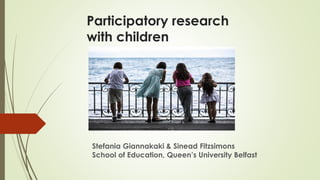
June 2016 participatory_research_brasil-converted
- 1. Participatory research with children Stefania Giannakaki & Sinead Fitzsimons School of Education, Queen’s University Belfast
- 2. What is participatory research with children? Children as co-researchers in studies Children as advisors in studies
- 3. Why involve children in research? Children have the right to have a say in matters that affect them, including research (UN Convention on the Rights of the Child). By having a say, they experience and learn democratic participation. They acquire useful research knowledge and skills. They help produce research of better quality. They produce research that better meets their needs and priorities.
- 4. Children can help: Boost response rates (e.g. facilitating access to research participants) Find innovative ways to collect data. Ensure that research tools (e.g. interview questions) use words that children understand. Conduct interviews so that other children feel more comfortable answering questions. Bring an additional perspective to the interpretation of findings. Communicate research findings in a better way (esp. to other children). Why do you think children can help produce research of better quality?
- 5. A practical example of having children as advisors in research Project title: Teachers’ educational beliefs and children’s voice practices in the Island of Ireland www.teachersbelief.com
- 6. Research aims To explore if and how children participate in school decisions. To examine what they think about their participation. To explain differences between schools. To examine if and how teachers’ beliefs about education affect children’s participation in school. Target group: primary schools in Northern Ireland and the Republic of Ireland.
- 7. Forming a Children’s Research Advisory Group (CRAG) in Northern Ireland Primary school with a diverse population of students. Invited all 10-year-old students to volunteer to be members of the CRAG. 8 volunteers randomly selected (3 boys, 5 girls). 3 meetings with the CRAG.
- 8. Meeting 1: introducing the research to children Getting to know each other. Explaining what research is. Explaining the project. Explaining their role as advisors in research.
- 9. Activity 1: What research is What do you think research is? ‘Searching for answers to a question that is important to me’. ‘Looking for information that helps answer this important question’. (we named this ‘important question’ the ‘big question’)
- 10. How do you gather the information needed to answer the ‘big question’? By searching the internet By reading books By asking people a number of ‘little questions’ By observing people
- 12. The ‘big questions’ of our study What are children’s experiences and opinions of participating in school decisions? How do these experiences and opinions differ between different school and why? How can children’s participation in schools be improved?
- 13. Activities 2 & 3: Familiarising children with our research topic Activity 2 – thinking about ‘voice’ and ‘influence’ in school Two groups of 4 children: One thinking about children’s voice in school One thinking about adults’ voice in school
- 16. Activity 3 – discussing different perspectives on children’s voice Working in pairs to judge the validity of different statements about children’s voice.
- 17. Statements: It is the teacher who decides what activities children will carry out in the classroom. Children and teachers are seen as equals in school. They work together as partners. Children are asked for their opinions about teachers. Children are given enough information to understand why teachers make certain decisions in school. All children have the same opportunities to express their opinions and influence school decisions. Children have a say in what they learn in school. Children have a say and influence decisions about after-school activities.
- 19. Meeting 2: developing focus group questions (‘little questions’) Activity 1: drafting ‘little questions’ to ask other children in other schools
- 21. Activity 2: Giving feedback on questions the researchers had drafted.
- 22. Activity 3: Role play the interview in pairs (asking another child the drafted questions) Note: this activity had to be skipped due to time constraints
- 23. Activity 4: Feedback on general design issues Size of focus groups Age groups of children Location of interviews Difficult words to avoid How to ensure that all children talk during the focus groups
- 24. Examples of advice given by CRAG members: Meet the children before the interviews Interview them in small groups of friends (4-5) Better to be interviewed by other children (not adults) Give them certificates of participation signed by CRAG members Provide them drinks and biscuits Be friendly
- 25. Meeting 3: analysis and interpretation of focus group data (to take place in January 2017) Invite CRAG members to help with: Interpreting children’s open-ended responses Basic grouping / coding of open ended responses Validating emerging findings (ask children to comment on emerging findings) Developing suggestions for additional analysis Selecting quotations to illustrate specific points
- 26. Example from another study (Lundy et al., 2011): Why some children like school bags and others consider it a ‘hard thing’?
- 27. Rewarding our CRAG members £200 to use collectively in the school Letting them have the findings of our study
- 28. Involving children in dissemination Invite children to the end-of-project dissemination event. Invite children to present aspects of the study they were involved in.
- 29. Research phases in which children were not included in our project Design of research questions Selecting the methodology Data collection Reporting of findings Making practice and policy recommendations
- 30. Can you identify any issues in the approach presented so far?
- 31. References Lundy, L., McEvoy, L. and Byrne B. (2011) Working with young children as co-researchers: an approach informed by the United Nations Convention on the Rights of the Child, Early Education and Development 22(5), 714-736. Shaw, C., Bracy, L. M. and Davey, C. (2011) Guidelines for Research with Children and Young People. London: NCB Research Centre.